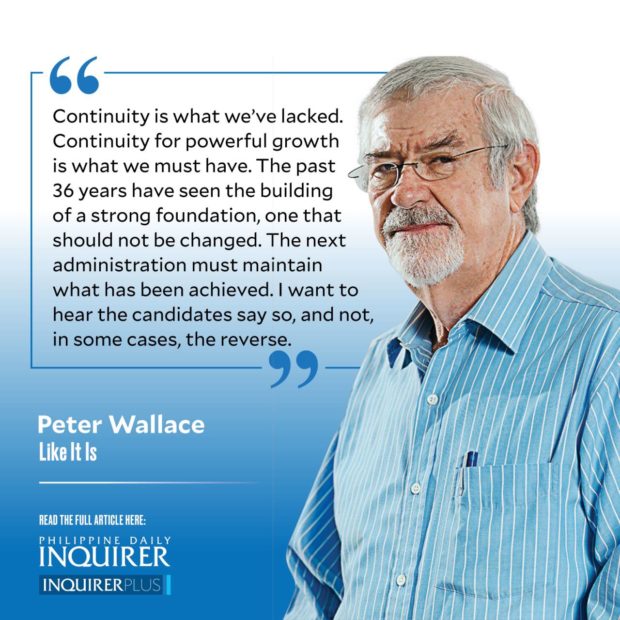Discontinuity

Last week, I spoke about the need for continuity from one administration to the next. And, in the main, we’ve had it, leading to commendable growth and the creation of a sound economic base. Where we’ve not had it though is on major projects. One reason is people. We don’t elect someone based on their policies, and the continuity of them. Only in Cory Aquino’s case was the anointed, Fidel V. Ramos, chosen by the people to follow her.
Cory was the beginning of a new era, so she had to make a fresh start with some very necessary changes from Marcos’ rule — the most important being a new Constitution (one that needs change now as a top priority of the next administration). But she also made some highly erroneous ones that set the country back, the most damaging ones being abolishing the Ministry of Energy because it was corrupt, and not firing up the Bataan Nuclear Power Plant because it was a ticking bomb waiting to go off. We ended her term with daily blackouts. She put Filipino First as a basic policy, slowing potential growth substantially.
Ramos not only kept the policy directions of Cory, but he also built upon what she had started, and did something no one else did: kept the good political appointees who had the technical expertise. So, the important continuity of the top people was maintained. The wholesale discard of almost all the top officials of a previous administration threatens continuity. Although, wisely, he reversed her decision on energy, and signed a law creating the Department of Energy and gave us back the lost power.
Joseph Estrada, well, I’m not sure he did anything, except investigate Ramos projects, slowing them, but not stopping them.
Gloria Macapagal Arroyo, suffering from coups attempting to unseat her, did much that was right, but made populist decisions that cost the country dearly, resulting in a debt-to-GDP ratio that spiked at 70 percent, which she then tried to fix by raising value added tax from 10 to 12 percent. She also canceled the contract of Philippine International Airport Terminal Co. and German firm Fraport to build the Ninoy Aquino International Airport Terminal 3 awarded by Ramos back in 1997 due to alleged irregularities. The legal battle that ensued delayed the opening of the terminal for six years.
Benigno “P-Noy” Aquino III spent his first year investigating Arroyo and canceling some of her better projects for unsound reasons—the Belgians dredging Laguna de Bay, a $430-million project, being a prime example. He also forced a reinterpretation of the Metropolitan Waterworks and Sewerage System contracts that left the concessionaires no choice but to bring the case to arbitration, slowing down civil works generally. As a result, infra spending dropped sharply and with it GDP growth, which was only 3 percent in his first year, thereby slowing down progress through a focus on arbitration to resolve issues. The Aquino administration also botched the maintenance contract deal for MRT-3 by not renewing the contract with Sumitomo, the firm that built, designed, and maintained the MRT-3 system.
President Duterte pivoted away from the public-private partnership program of P-Noy to concentrate more on official development assistance and foreign government loans, especially from China. But China’s grandiose promises ($9 billion in soft loans and $15 billion in investment promised) have not lived up to reality. Only $1.6 billion of loans and grants and $3.2 billion of investments have been received so far. He also forced changes in the contracts with the water concessionaires, putting in question the sanctity of contracts.
As these two columns show, continuity must be maintained if you want solid growth. Where change has been forced, it has disrupted that growth. You don’t build a strong economy in six-year spurts. China set in place a long-term plan back in 1978, and Xi Jinping adopted it, leapfrogging China into soon-to-be the world’s top economy. Not that I’m suggesting for a moment that we have a decades-long autocrat as leader, but successive democrats with a shared vision.
To maintain continuity, we should do what Australia does. It has a minister (our secretary) who’s a political appointee leading each ministry (department), but a head of the ministry that is a career official (called a secretary just to confuse you). The minister deals with parliament (Congress) and the political and public issues; the secretary runs the ministry on a day-to-day basis, over which the minister has little say. It establishes a continuity, as it’s more difficult to make any untoward shift.
Continuity is what we’ve lacked. Continuity for powerful growth is what we must have. The past 36 years have seen the building of a strong foundation, one that should not be changed. The next administration must maintain what has been achieved. I want to hear the candidates say so, and not, in some cases, the reverse.
















